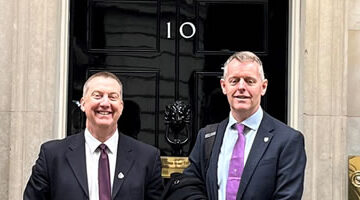President’s Blog November 2016
And so it begins! A new presidency, with its heady mix of hard work, sweat, excitement and a little trepidation. Similar perhaps to a busy late shift in the Emergency Department.
That late shift also in many senses is a microcosm of the strengths, opportunities and frustrations of our specialty at present. It reflects the challenges we face in managing increasing workload, complexity of decision making and the fragility of wider systems that lead to worsening exit block with its consequences for our patients and staff. Balanced on that seesaw is the remarkable talent, teamwork, breadth of knowledge, leadership resilience and agility of thinking that makes the modern day emergency physician stand out so positively in acute healthcare. We know that at our best we are able to dismantle those challenges but we need the right tools, time to design aligned systems and others to take leadership responsibility for their parts in that wider system.
This presidency will be focused on helping our members and fellows to have the right environment to practice their art. Training them so that standards of emergency care delivery for our patients can be driven ever higher and creating opportunities to educate and showcase their talents so that they may flourish. But first we must find ways to create stability in our ever more fragile departments, to make them safer and have the ability to focus on what we regard as ‘quality’ in ED care delivery.
At my recent keynote at the excellent Annual RCEM Bournemouth conference ( if you didn’t go, you missed a treat, #utterlysuperb) I spoke about the 10 P s of presidency. I will be revisiting all those words in time but wanted to share with you my thoughts on just three that I will be mainly focusing my energies on in the coming months.
Policy
The College has been strong on policy over the years and we have certainly made great progress on a number of fronts. We will continue to build on the great work of the past, most recently, the excellent STEP campaign.
We know that staffing levels especially in midsized and smaller EDs continue to be stretched to the very limit. This impacts on safer care for patients but also on the sustainability of staff being able to work consistently and productively. We have done great work devising solutions to create sustainable and satisfied workforce. We will aim to engage with Executive Boards of Trusts and regulators in this important area to push it up their agenda. Importantly, as news on the new Consultants contract emerges we will be in active discussions with the BMA to ensure we align with what is required.
Emergency care villages or co-location models that seemed a major challenge to deliver in 2003 when first introduced, reinforced at regular intervals since then, are now being increasingly recognized in the lexicon of system design. We know that in the Drive for Quality in 2012 there were 45% of EDs that had some form of co-location and it was a key recommendation of that report. Yet the right form of alignment of services at the front door continues to elude us, driven often by conflicted organisations and lack of wider system integration and leadership. The significant rise in workloads in our EDs, driven by us being the ultimate safety net and having to help other wider system failures is no longer acceptable. It makes the case for better access, alignment and integrated co-location models overwhelming. An external observer to the NHS might regard it a form of corporate negligence not to create such safer system design solutions!
Exit block, an insipid, horrible disease of acute healthcare systems, is we know really in the hands of central governments, policymakers and regulators who fund, design and regulate systems. We may well squeeze more ‘Lean’ methodology and address organizational behaviours but poor practices can emerge to squeeze efficiency ( or worse still gaming and bullying behaviours!) to make the numbers of breaches more palatable for an Exec Board meeting. We know exit block leads to increased morbidity and mortality, that it has worsened as we spend less on acute healthcare ( predicted GDP spend on health in UK will be 6.2%, significantly below the European average by 2020) and that this leads all to often to an intense working environment in ED. I will be lobbying hard with governments to ensure we find a way forward so that we can regularly maintain focus to create resilience in our systems and minimize exit block.
Patients
At the heart of all these activities are our patients and the quality of care we provide for them. It is remarkable that so much excellent work of 6-7 years ago, developing quality indictors of safety and clinical care has been lost. There is no doubt that the 4hr EC standard is essential to help systems take responsibility for flow but we also need to be given the ability and resources to define the quality measurements that we think are important to us and our patients. I am keen that we have #metricsthatmatter . More on that in the near future.
Pact
A central function of College is the ‘pact’ between us as an organization and our members. A core function of RCEM is to drive for the very highest standards of training and academia nationally and internationally. Our training fill rates are improving again after a lag but there is so much more to do if we are to optimize retention and allow our trainees to fulfill their dreams. We also know that training for all our staff must have a better focus. Much more to come in this key area.
In addition, we appreciate the need to better understand how we can help and represent you as well as creating great opportunities for you to participate in RCEM activities (training, exams, educational events, committee work etc). If you want to help or just give feedback, on any of these issues, please email contribute2RCEM@rcem.ac.uk
I am also keen that we showcase our best talents and as a starter for 10, urge you to attend with your teams our Clinical Leaders Conference in London on Nov 29th 2016. Entitled ‘Showcasing Excellence’ we will hear about great work by practicing emergency physicians from all around the UK.
Final thoughs
My time in these first few weeks has been hectic working closely with colleagues ( as well as meeting politicians, policymakers etc) to ensure that we have a strategic focus that is ‘fit for purpose’. Amongst the many things we have done so far, I am absolutely delighted to invite onto a re-organised RCEM Executive, Vice Presidents from Scotland, Wales & Northern Ireland. They will add valuable expertise and we as a College will be able to better support them in their endeavours in their own nations. Further discussions are ongoing with the Irish Association for EM too.
Like any good ED shift, that may seem to have been a bit of a whirlwind tour of my first few weeks filled with excitement and also a healthy impatience to get things done. And like any shift should end, by thanking our teams for their help, I thank you for your support for RCEM and for all those who have kindly passed on good wishes for my presidency. It is has been much appreciated!
Dr Tajek Hassan
President, The Royal College of Emergency Medicine
@RCEMPresident


0 Comments